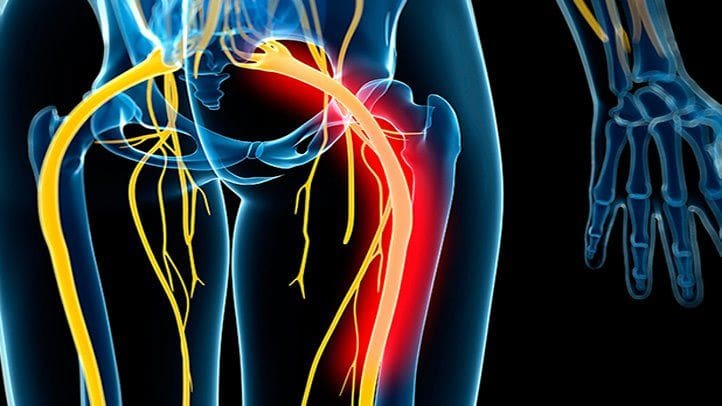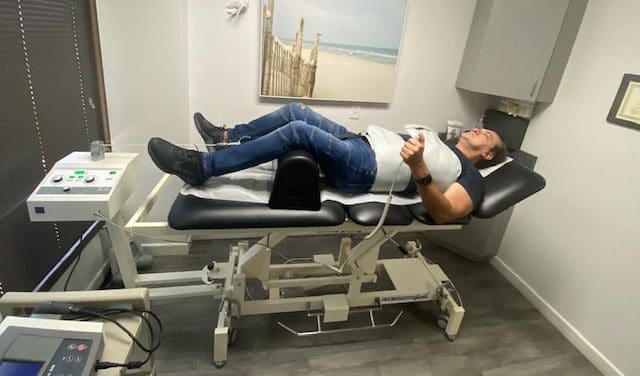
Table of Contents
Introduction
The central nervous system in the body controls every muscle, tissue, organ, and nerve all over the entire structure. Since the nervous system in the body contains two main parts that keep the body functioning: the central nervous system and the peripheral nervous system, these two systems work hand in hand as the central nervous system is composed of the brain and the spinal cord. In contrast, the peripheral nervous system is composed of all the nerves branched out from the spinal cord and extended throughout the entire body. One of these nerves is the sciatic nerve, and when it gets irritated, it can send hot, burning pain from the lower back down to the feet. Luckily, non-surgical treatments like decompression can help alleviate sciatic nerve pain for many suffering individuals. For today’s article, we will be discussing the sciatic nerve, what happens when it gets affected and how decompression therapy can help alleviate sciatic nerve pain. By referring patients to qualified and skilled providers specializing in spinal decompression therapy. To that end, and when appropriate, we advise our patients to refer to our associated medical providers based on their examination. We find that education is the key to asking valuable questions to our providers. Dr. Alex Jimenez DC provides this information as an educational service only. Disclaimer
Can my insurance cover it? Yes, it may. If you are uncertain, here is the link to all the insurance providers we cover. If you have any questions, please call Dr. Jimenez at 915-850-0900.
What Is The Sciatic Nerve?
Are you feeling a searing, burning pain traveling from your buttocks to your feet? Has this pain felt uncomfortable when you try to stretch it out? Or does this pain hinders your ability to walk around to relieve the symptoms? It could be due to your sciatic nerve becoming irritated. Research shows that the sciatic nerve is the largest in the human body, originating from the lower back and traveling down to the feet. This nerve is part of the peripheral nervous system and is an important nerve that allows the legs to function like generally walking, running, and even standing so the body doesn’t fall over, as research shows. The sciatic nerve in the body provides two functions for the legs: motor function, which makes the leg’s muscles move from one place to another, and sensory function, which helps the person feel the sensations on their feet. When there are factors that cause the sciatic nerve to become irritated, it can lead to unwanted pain that can affect either side of the legs causing sciatica to form.
What Happens When The Sciatic Nerve Gets Affected?
When the sciatic nerve is being affected by numerous factors, research studies have stated that irritation, compression, and inflammatory factors affecting the lower back portion of the body also affect the sciatic nerve. This causes a symptom known as sciatica, and it can affect the lower half of the body down to the feet, affecting one side of the body in either leg. Research studies have found that sciatica usually starts to affect the legs through a herniated disc in the spine that pinches the sciatic nerve, causing searing, burning pain radiating down the back of the leg. Fortunately, there are treatments available to help sciatic nerve pain from progressing further and can even help alleviate other issues affecting the lumbar area of the back. When it is not treated right away, sciatica can cause permanent nerve damage to the lower half of the body.
Decompression Benefiting The Sciatic Nerve- Video
Feeling agonizing, burning pain emitting from the buttocks down to the feet? Does it hurt to walk a short distance? How about feeling low back pain on top of leg pain? You could be experiencing sciatic nerve pain, and decompression might give you the relief you are searching for. The video above explains the top 3 ways to apply traction or decompression to the spine and how it can help relieve back issues like sciatic nerve pain. Decompression helps the spine by taking the compressed spinal disc pressure off the irritated sciatic nerve root. This allows instant relief to individuals suffering from sciatica and alleviates other back and leg issues that make them miserable. Suppose you want to learn more about decompression and how it can benefit you in relieving sciatic nerve pain or even sciatica in the lower half of the body? This link will explain what it does for the sciatic nerve and the lower back.
Decompression Can Help Alleviate Sciatic Nerve Pain
Many beneficial treatments can help alleviate sciatic nerve pain and relieve many individuals suffering. Treatments like surgical decompression can help ease sciatic nerve pain. Research studies have found that endoscopic sciatic nerve decompression is helpful to help take the pressure off the sciatic nerve and improve the person’s hip function. This type of surgical decompression can help reduce the sciatic nerve pain associated with deep gluteal syndrome entrapping the sciatic nerve and causing radicular pain. Other treatments that can help with sciatic nerve pain are non-surgical decompression. Research studies have shown that non-surgical decompression can help increase the space of the intervertebral discs that are compressed and reduces the pressure off the irritated sciatic nerve root. Non-surgical decompression allows the lower half of the body to feel relieved by decreasing the mechanical stress it’s been under, improves mobility in the lower half, and reduces muscle spasms in the legs. Decompression treatments are beneficial to anyone that wants relief from sciatic nerve pain in their legs.
Conclusion
Therefore, the sciatic nerve is the largest in the peripheral nervous system, located in the lower back, and travels down to the feet. This nerve has two primary functions that help the legs be in motion and feel sensations occurring in the feet. When unwanted factors start to affect the lower back, it can either irritate, compress, or inflame the sciatic nerve causing symptoms like sciatica to affect the legs. Treatments like decompression therapy can help take the pressure off the irritated sciatic nerve and relieve the individual from low back and leg pain. Incorporating decompression therapy is beneficial for many individuals that want to be pain-free on their health and wellness journey.
References
Giuffre, Brittney A, and Rebecca Jeanmonod. “Anatomy, Sciatic Nerve.” In: StatPearls [Internet]. Treasure Island (FL), StatPearls Publishing, 29 July 2021, www.ncbi.nlm.nih.gov/books/NBK482431/.
Ham, Dong Hun, et al. “Effectiveness of Endoscopic Sciatic Nerve Decompression for the Treatment of Deep Gluteal Syndrome.” Hip & Pelvis, Korean Hip Society, Mar. 2018, www.ncbi.nlm.nih.gov/pmc/articles/PMC5861023/.
Medical Professionals, Cleveland Clinic. “Sciatic Nerve: What Is, Anatomy, Function & Conditions.” Cleveland Clinic, 15 June 2021, my.clevelandclinic.org/health/body/21618-sciatic-nerve-and-sciatica.
Staff, Mayo Clinic. “Sciatica.” Mayo Clinic, Mayo Foundation for Medical Education and Research, 1 Aug. 2020, www.mayoclinic.org/diseases-conditions/sciatica/symptoms-causes/syc-20377435.
Wegner, Inge, et al. “Traction for Low-Back Pain with or without Sciatica.” The Cochrane Database of Systematic Reviews, John Wiley & Sons, Ltd, 19 Aug. 2013, www.ncbi.nlm.nih.gov/pmc/articles/PMC6823219/.
Yeomans, Steven. “Sciatic Nerve and Sciatica.” Spine, Spine-Health, 7 June 2019, www.spine-health.com/conditions/sciatica/sciatic-nerve-and-sciatica.
Disclaimer
Disclaimers
Professional Scope of Practice *
The information herein on "How The Sciatic Nerve Benefits From Decompression" is not intended to replace a one-on-one relationship with a qualified health care professional or licensed physician and is not medical advice. We encourage you to make healthcare decisions based on your research and partnership with a qualified healthcare professional.
Blog Information & Scope Discussions
Welcome to El Paso's wellness blog, where Dr. Alex Jimenez, DC, FNP-C, a board-certified Family Practice Nurse Practitioner (FNP-C) and Chiropractor (DC), presents insights on how our team is dedicated to holistic healing and personalized care. Our practice aligns with evidence-based treatment protocols inspired by integrative medicine principles, similar to those found on dralexjimenez.com, focusing on restoring health naturally for patients of all ages.
Our areas of chiropractic practice include Wellness & Nutrition, Chronic Pain, Personal Injury, Auto Accident Care, Work Injuries, Back Injury, Low Back Pain, Neck Pain, Migraine Headaches, Sports Injuries, Severe Sciatica, Scoliosis, Complex Herniated Discs, Fibromyalgia, Chronic Pain, Complex Injuries, Stress Management, Functional Medicine Treatments, and in-scope care protocols.
Our information scope is limited to chiropractic, musculoskeletal, physical medicine, wellness, contributing etiological viscerosomatic disturbances within clinical presentations, associated somato-visceral reflex clinical dynamics, subluxation complexes, sensitive health issues, and functional medicine articles, topics, and discussions.
We provide and present clinical collaboration with specialists from various disciplines. Each specialist is governed by their professional scope of practice and their jurisdiction of licensure. We use functional health & wellness protocols to treat and support care for the injuries or disorders of the musculoskeletal system.
Our videos, posts, topics, subjects, and insights cover clinical matters, issues, and topics that relate to and directly or indirectly support our clinical scope of practice.*
Our office has reasonably attempted to provide supportive citations and has identified the relevant research studies or studies supporting our posts. We provide copies of supporting research studies available to regulatory boards and the public upon request.
We understand that we cover matters that require an additional explanation of how they may assist in a particular care plan or treatment protocol; therefore, to discuss the subject matter above further, please feel free to ask Dr. Alex Jimenez, DC, APRN, FNP-BC, or contact us at 915-850-0900.
We are here to help you and your family.
Blessings
Dr. Alex Jimenez DC, MSACP, APRN, FNP-BC*, CCST, IFMCP, CFMP, ATN
email: coach@elpasofunctionalmedicine.com
Licensed as a Doctor of Chiropractic (DC) in Texas & New Mexico*
Texas DC License # TX5807
New Mexico DC License # NM-DC2182
Licensed as a Registered Nurse (RN*) in Texas & Multistate
Texas RN License # 1191402
ANCC FNP-BC: Board Certified Nurse Practitioner*
Compact Status: Multi-State License: Authorized to Practice in 40 States*
Graduate with Honors: ICHS: MSN-FNP (Family Nurse Practitioner Program)
Degree Granted. Master's in Family Practice MSN Diploma (Cum Laude)
Dr. Alex Jimenez, DC, APRN, FNP-BC*, CFMP, IFMCP, ATN, CCST
My Digital Business Card








